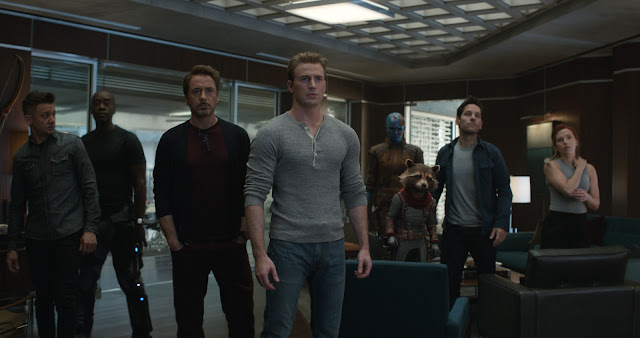To love and let go.
Avengers: Endgame,
by Joe Russo, Anthony Russo, Christopher Markus and Stephen Mc Feely.
The business of the
great studios behind the seventh art has fatigued its clients,
without even blushing and for more than half a century, with a
shameless saturation of the same four genres (drama, romance, comedy,
action at gunpoint) and its handful of storylines, regurgitated ad
infinitum.
It is true
that from time to time the viewer is allowed to enjoy fantasy with
its ocean of possibilities, but the results of those brief lapses of
unlashed creativity were never more than a few quality jewels quickly
buried under an avalanche of mediocre imitations searching for a
quick success in the box office.
However, when
the same business understand that artistic renovation would
eventually lead to more money, is when creativity and his carriers
are not just allowed to exist, but even encouraged.
Thus, since a
little more than a decade, the enthusiastic cinephile enjoys the
closest thing to a miracle that the industry could offer: a new
flavor to surprise a palate saturated with tons and tons of little or
nothing.
I do not
intend to deny that the genre of superheroes has had very good
background in cinema, or forget that the serials (Flash Gordon and
Buck Rogers as great examples) have existed to delight of the golden
age. However, the successive combination of individual and group
chapters, replicating on the big screen the experience of the comics
and their grandiose sagas, is something that has never been seen
before, or at least not on this scale.
Avengers
Endgame, the dreamlike final chapter in the first Saga of the Marvel
studios, is an example of everything the genre has been able to offer
in almost a century of countless, fruitful color pages.
But above all
things, it is a declaration of true love to the films that preceded
it, and to the many audiences that enjoyed them. For the latter, the
endearing offering of known places and iconic phrases.
In
conjunction with its immediate predecessor (Infinity War) Endgame
surpasses almost effortlessly the original piece of art (The Infinity
Gauntlet, by Jim Starling and George Pérez), using the key points of
the comic to tell a much more intimate story, which speaks of human
pain and urgencies long before the heroic acts with all their
inevitable, necessary paraphernalia (as in Civil War, the Russo
brothers rethink the unattractive consequences of actions
supernatural, that do not skimp vibrant explosions, colorful cosmic
rays, and brutal exterminations at the hands of a mad Titan).
Truly
emotional without the need for low blows or melodrama, it shines like
a diamond when displays tragedy and failure through humor. As occurs
in Pagliacci or The Man Who Laughs, the laughter of the public rests
on a mantle of suffering.
Although
covered with an emotional quality unthinkable for the genre a few
decades ago (with the sole exception of Unbreakable, by M. Night
Shyamalan), at one point the logic of the plot begins to crumble, and
this is largely due to the use of a narrative resource that, in
itself, has always been an invitation to chaos. Lead by such a
device, forced elements are added to the abandonment of all reasoning
more than once. And if that alone were not enough, despite their
indisputable successes behind the cameras, the Russo brothers have
demonstrated with their four interventions in the Marvel universe
that they have never had the slightest desire to learn the limits and
scope of each one of the heroes whose actions they have directed.
Unfortunately, at this point in the Infinity Saga the black holes in
the plot and the slack, loose treatment of heroes skills are not
unique to a single movie or creative team, and have become as
inevitable as the mad Titan.
But far
beyond its brief momentes of clumsiness, Endgame succeed where it
needs to: wrapping with a golden gauntlet a saga of more than twenty
previous chapters. And in doing so, it says goodbye (and invite its
public to say goodbye) of some of its fundamental pillars, dressing
their fates of tragic sacrifice, expected heroism, and a more than
deserved voluntary retirement.
Undoubtedly
the machinery will remain in operation, and with more talent than
good luck it will be possible for new sagas to emerge, maybe as good
as its precursor.
For whom this
writes, however, the second time will not be as good as the first,
because it will not represent the same.
But don´t
get me wrong, I'm not complaining, I can not complain.
The superhero
genre has finally reached the cinemas, with its original collection
of narrative gadgets. And that is more than enough for me.
Like the old,
satisfied man that owns a fulfilled life in his memory, we can sit
quietly and contemplate the promising waters of the future.



Comments
Post a Comment